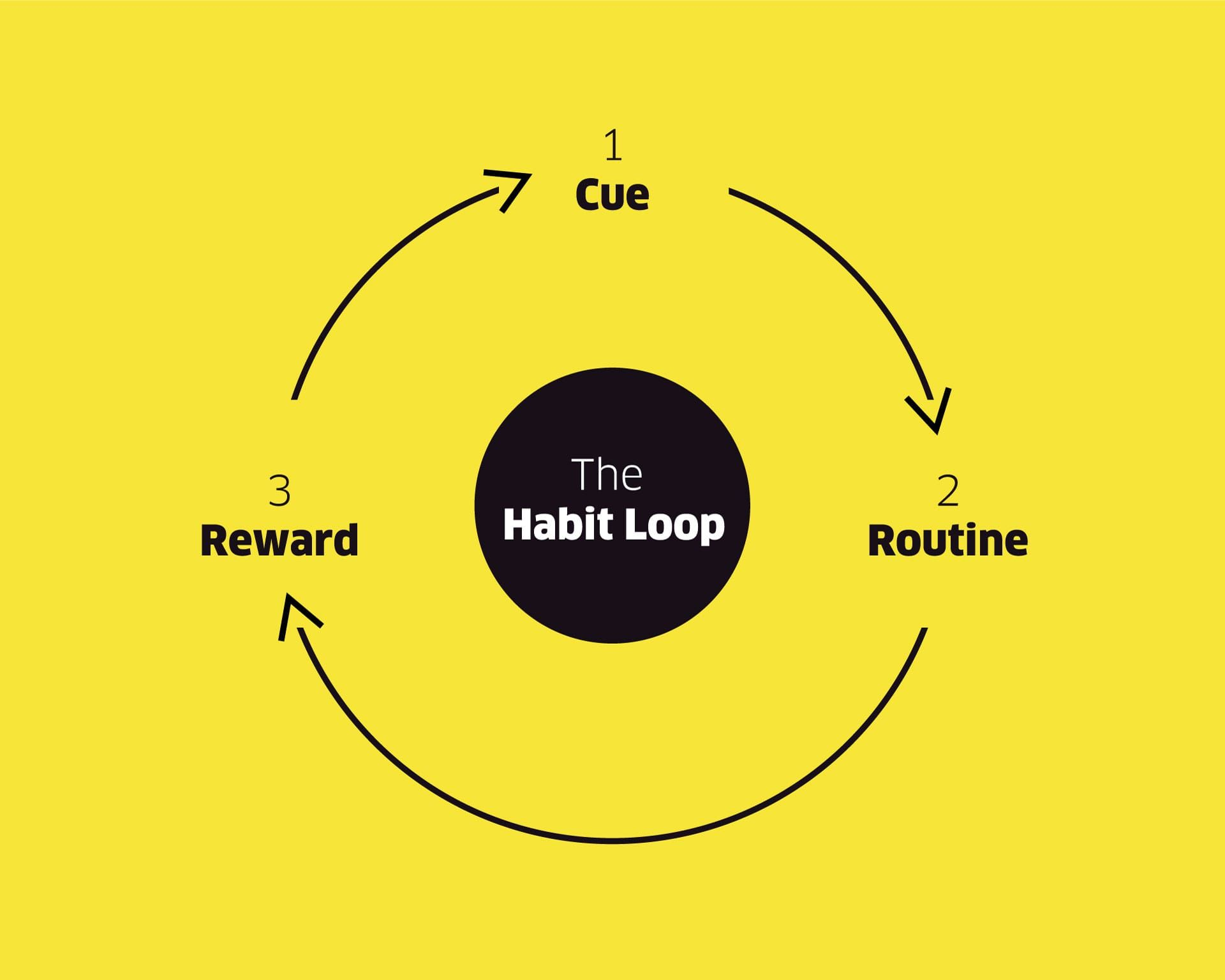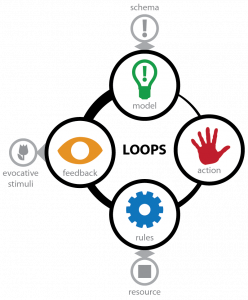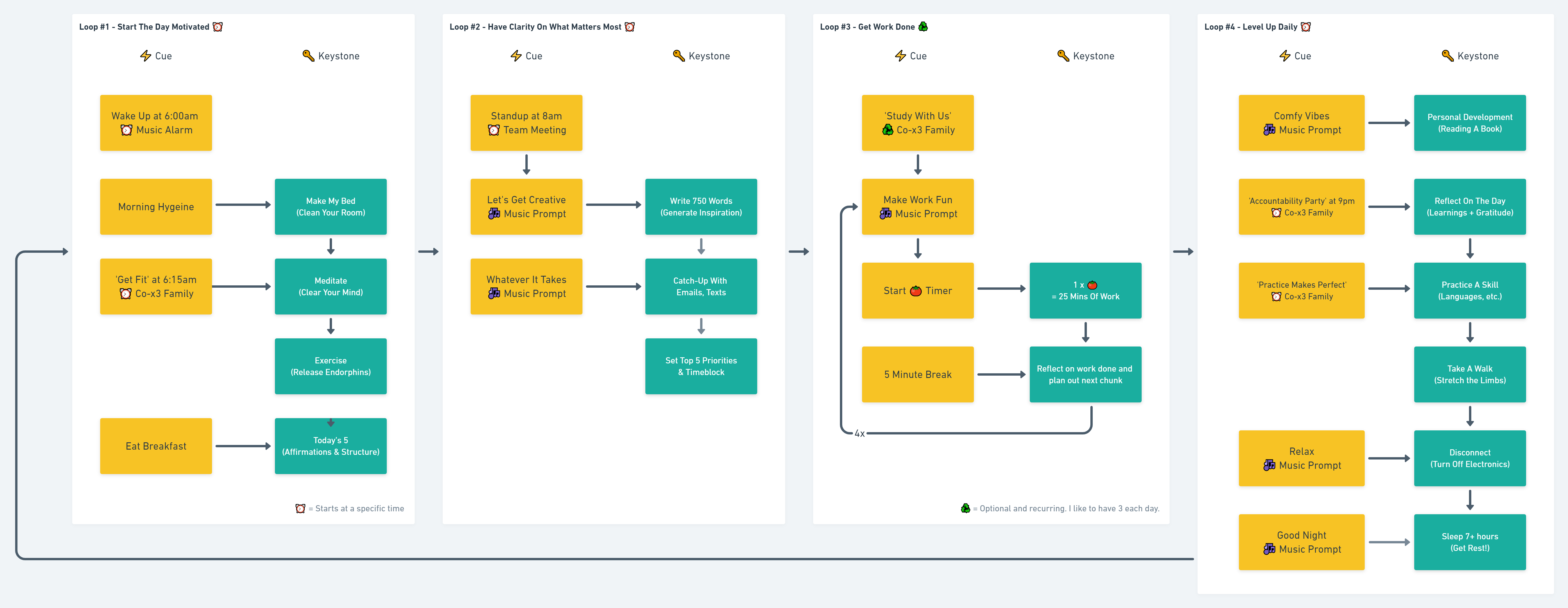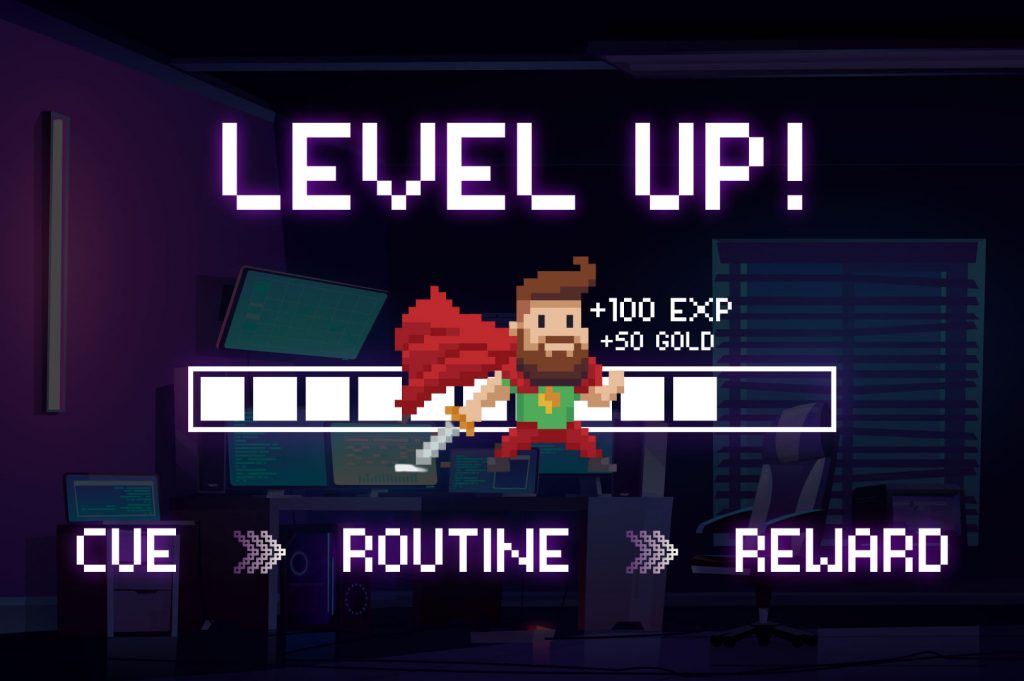Key Takeaways
- Having a routine can be helpful in harnessing control in times of uncertainty and stress;
- Building intentional habit loops generate consistency towards desirable outcomes;
- Make the routines more enjoyable and automatic with gamification.
Feeling low energy recently? You’re not alone.
With the most recent changes in the world, all our daily lifestyles have been impacted. If we used to commute regularly to the office, we now can work from home with flexible hours – meaning we sleep and wake up at unpredictable times. Schools have become online, many of which don’t have regular class times – thus promoting more independent study.
I’m sure you, like many of us, noticed drastic changes in our productivity and motivation with the loss of structure in our lives. So how can we turn this situation around?
Routines Are Important
I’ll always remember the great advice I received from one of my mentors at university – treat school like a full-time job. Every day, no matter how many hours of class I have, or how many days until our next assignment is due – dedicate at least 8 hours to studying. This is a core practice that has benefited all aspects of my life. It doesn’t matter if I have any upcoming deadlines or not, I treat every day as a workday to work on my tasks consistently.
Having routines trigger an automatic response to certain actions, and puts your brain on auto-pilot; lowering the difficulty of starting the trained behaviour and increasing the efficiency of the job. This is a concept called reaching the line of automaticity.
Games make really good use of this hack to get you addicted to their application, and if we can understand how it works, it can be a superpower we can use to build and maintain any routine we want in our lives.
Games Suck Us In
If you’ve spent more than a few hours into a video game, you’ll probably notice that you soon fall into a predictable cycle of play.
Let’s take a quick look at Clash of Clans, with 100M+ reported players. This is what a typical user session looks like.
- Open the game
- Collect resources
- Browse what to build next
- Queue buildings to construct
- Close the game (until the building is complete)
Then, repeat 1-6, well, forever.
Players slowly progress and obtain achievements, without even noticing how many how much time we spend in the game. The loop becomes so second nature that whenever we sit down in a vehicle, it becomes the first app we open – our first interaction.
It has become an automatic process that builds progression with limited mental burden.
Our Unfortunate Misunderstanding
For those of us who are goal-oriented, we tend to lament repetitive chores that don’t seem to be moving the needle. We always want to do big things that make a huge impact – but what we don’t realize that it’s actually small steps that lead us to big successes.
“Most people overestimate what they can do in a day, and underestimate what they can do in a month.” – Matthew Kelly
Of course, just the knowledge that a repetitive task that we perform today is going to benefit us, in the long run, isn’t tremendously insightful or motivating; so what can we do to make our daily tasks more fun before it has become cemented in our day to day lives?
The Big Idea
I love learning and sharing about ways to understand how our brains work – because it offers us endless opportunities to hack it to do what we want.
We can learn so much by emulating the way ways games hack our brains to become a core part of our lives long after the initial entertainment and excitement wears off.
Games make it really simple for you to visualize progress towards big goals such as upcoming equipment unlocks, or next job advancement. They make the daily grind addicting and enjoyable, especially when you are playing with friends. So, last November, I embarked on the journey of turning my life into a RPG – leveraging the best practices behind gamification to make work fun, so we get stuff done.
To achieve the multiplayer effect, we built a community of like-minded thinkers endlessly passionate about productivity, growth, and learning to gamify our lives together.
This is the cumulation of decades of research, supported by a year of rigorous experimentation to determine exactly how to keep ourselves motivated, productive, and working consistently towards our goals.
Our 3 Fundamental Building Blocks
Whenever we start a discussion about habits, we have to acknowledge Charles Duhigg, who wrote the best selling book: The Power of Habit.
Habit Loops
Duhigg mapped out three elements to every habit:
- A cue,
- A routine,
- and a reward.
He referred to this sequence as a habit loop. Once this loop is formed, you start craving the reward when you engage in the routine, and eventually from the moment you are triggered with the cue.

For example, If you have a habit of running every morning when you wake up, the trigger (or cue) that leads you to do that is probably the sound of your alarm. Your alarm sends your brain into an automatic processing state, meaning it would actually take effort for you to dispute the trigger, while it would feel natural to move forward to get that feeling of satisfaction after completing your run.
This reward is why your brain determines the actions you took leading up to it are worth remembering in the future. The reward provides positive reinforcement for the behaviour, which in turn increases the likelihood you will do the actions again in the future. Charles continues to surmise that to displace negative habits in our lives, we should swap out the destructive behaviour for healthier routines that offers us the same reward.
This is fantastic to use as a base model to build strong habits. However, one starting weakness of this model is that for us to effectively build habit loops in our lives, we must gain a deep understanding of what rewards we crave, otherwise, no matter what routine we attempt to build, the loop will not hold.
So what can we do if we want to build a loop, but don’t know yet what rewards drive us?
Core Loops
Core loops, also known as compulsion loops, are a game’s main activities that players engage in repeatedly, in a looping sequence. The core loop is at the heart of the experience the game offers, and directly correlated with the retention of a user.
Games love retention, often utilizing engagement tactics such as first win of the day bonuses, daily loot box spins, or scarce energy resource that refreshes daily – they are making it a habit to engage with their application daily because while the eventual outcome is rewarding, the behaviour is as equally rewarding in itself.

A good core loop puts the player in a state of flow. Based on the mental model, the player devices an action. The action then is fed into the rules of the game, which outputs the results of the action. Finally, the player interprets the feedback, make changes to their mental model, and then takes their next action. If you are interested to learn more about loops in game design, watch this video.
When applying core loops to our lives, we can simplify the above diagram to the following principles.
- ✅ The loop should have a clear goal
- ✅ The loop should be short and enjoyable
- ✅ The loop should build on a strong theme
So, noting the addictive properties of games and social media, I strived to create my own core loop, so that the trigger, routine, and outcome are in my direct control, and I am always aware of the why behind my actions.
Habit Stacking
To be truly successful in building new habits, It’s important to understand the technique of habit stacking, as mentioned in the New York Times bestseller Atomic Habits by James Clear. You most likely already have a lot of strong connections built in your brain for existing habits you perform. One of the best ways to build a new habit is to identify a current habit you already do each day and then stack your new behaviour on top, leveraging the interconnected neuron highway that has already been built. We can treat a habit stack like a single action instead of a series of individual tasks.
The Superpower
Combining all of the principles shared above, it’s clear that we need to make the base mechanics of any routine that we are trying to build, fun! One way that I’ve successfully accomplished this is by treating daily habits in my life like daily quests to complete – making productivity tremendously enjoyable.
This is a diagram of the 4 loops that eagerly follow every single day.

These 4 simple loops govern my life and ensure that I…
- ✅ Start The Day Motivated
- ✅ Have Clarity Over What Matters Most
- ✅ Get Work Done
- ✅ Level Up Daily
⚡ Cues
I enjoy integrating multiple cues in my loops because it helps continue the loop if I ever get off track. Ideally, each habit can lead to another fluidly without any prompts – but it’s often useful to have cues help you shift to different gears. I take advantage of 3 types of cues. Timed cues happen every day – so they are reliable and unavoidable. Accountability cues involve others and names them as accomplices to kickstart my loop – and hold me accountable for doing them.
Music cues are amazing, especially when you consistently change your environment. You always retain the best memory of the habit you’re building if you are doing it in the same environment. Music is a way for you to maintain elements of the same environment anywhere so you are relatively at the same output, no matter where you are.
🔑 Keystone
Keystone habits can be defined as “small changes or habits that people introduce into their routines that unintentionally carry over into other aspects of their lives. According to Charles Duhigg, these habits spark “chain reactions that help other good habits take hold.” In other words, building a keystone habit is like knocking down the biggest domino — it will automatically knock down the other dominoes as well.
Watch how I gamified each loop and walk through a day in my life. 👇
So, what is your core loop? And how can you make it more exciting by gamifying the process?


